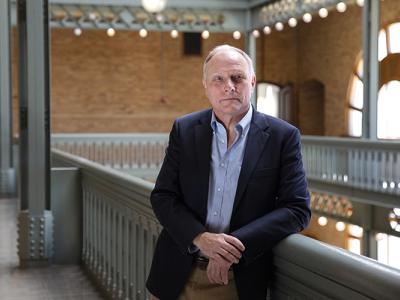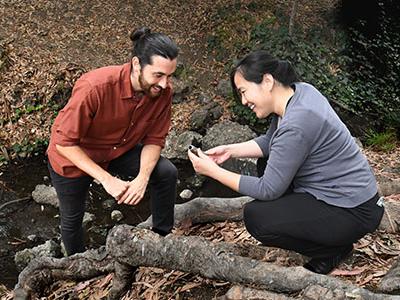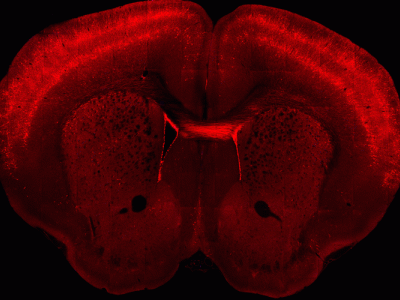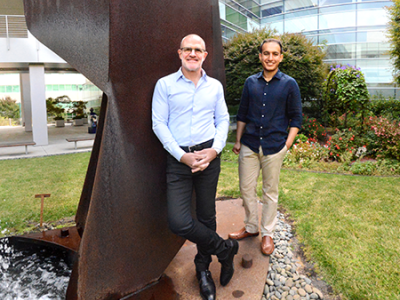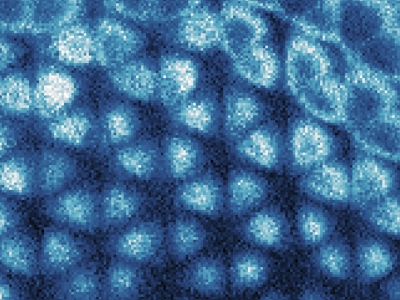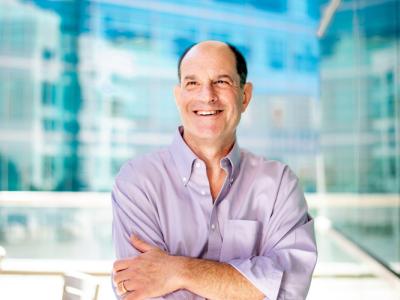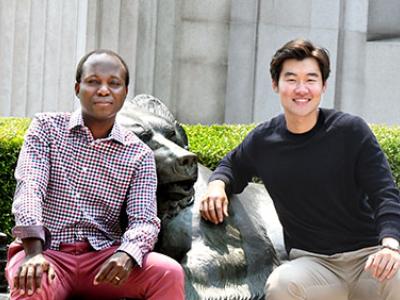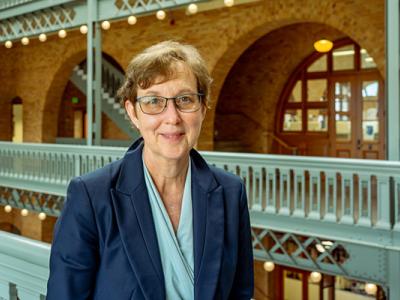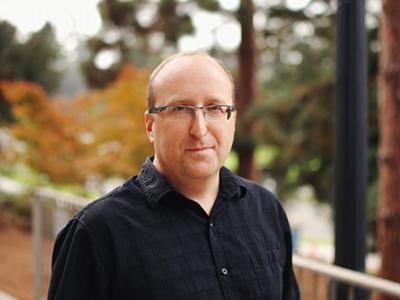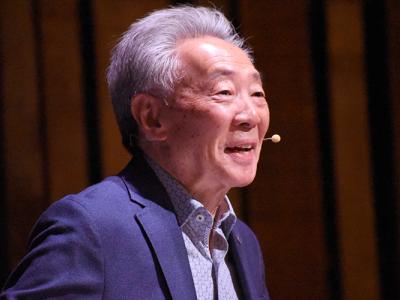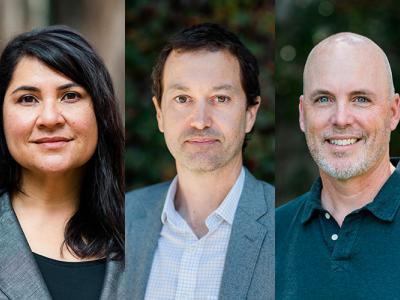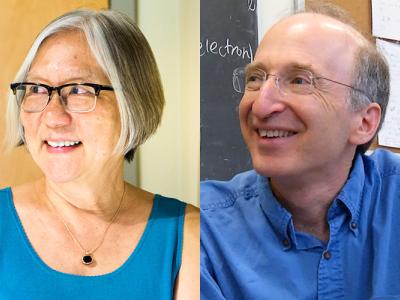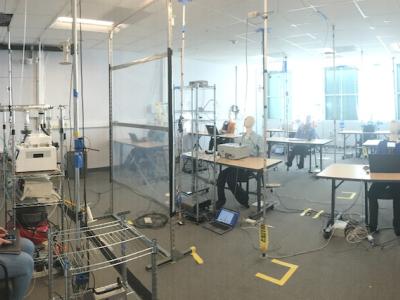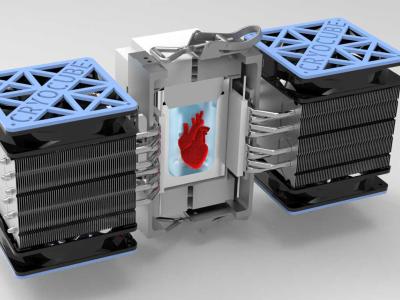David Card, a labor economist and professor of economics at the University of California, Berkeley, has won the 2021 Nobel Memorial Prize in Economic Sciences for work that challenged orthodoxy and dramatically shifted understanding of inequality and the social and economic forces that impact low-wage workers.
Research News
Learn more about UC Berkeley's researchers and innovators.
Showing 945 - 960 of 3495 Results
The United States is facing a serious public health problem from lead contamination of drinking water, especially in rural areas and large cities where efforts to replace aging water service lines has lagged. Bakar Fellow Baoxia Mi believes she and her research group have found a solution. An expert on advanced membrane processes and nanotechnology, Mi has focused her research on addressing the challenges to maintaining a healthy and sustainable water supply, including in addition to drinking water quality, desalination, wastewater reuse, renewable energy production, and public health protection.
When you clicked to read this story, a band of cells across the top of your brain sent signals down your spine and out to your hand to tell the muscles in your index finger to press down with just the right amount of pressure to activate your mouse or track pad.
A slew of new studies now shows that the area of the brain responsible for initiating this action — the primary motor cortex, which controls movement — has as many as 116 different types of cells that work together to make this happen.
Netherton Syndrome is a rare, genetic skin disease that can be fatal to neonatal patients. It's caused by a mutation in a gene for an enzyme known as LEKTI. There is no cure. With support from the Bakar Fellows Program, bioengineer Jay Keasling aims to employ a harmless bacterium to deliver the LEKTI enzyme that Netherton children lack, restoring the natural cycle that assures healthy skin and giving them a chance for a normal life.
More than 90 years ago, physicist Eugene Wigner predicted that at low densities and cold temperatures, electrons that usually zip through materials would freeze into place, forming an electron ice, or what has been dubbed a Wigner crystal.
While physicists have obtained indirect evidence that Wigner crystals exist, no one has been able to snap a picture of one — until now.
UC Berkeley physicists published last week in the journal Nature an image of just such an electron ice sandwiched between two semiconductor layers. The image is proof positive that these crystals exist.
David Julius, one of today’s winners of the 2021 Nobel Prize in Physiology or Medicine, was a standout even as a graduate student at UC Berkeley in the 1970s and ’80s, according to one of his mentors, 2013 Nobel laureate Randy Schekman.
Their inner workings reside in the realm of physics, but lasers make everyday life possible. With support from the Bakar Fellows Program, Boubacar Kante is preparing to fabricate a prototype and demonstrate the potential of the Bound State in Continuum Surface Emitting Laser (BICSEL) for a range of applications.
UC Berkeley computer scientist Kathy Yelick, an active scholar, teacher and leader on campus and at Lawrence Berkeley National Laboratory for the past 30 years, has been named the campus’s next Vice Chancellor for Research. Her appointment will begin on January 1, 2022.
In 1965, Gordon Moore of Intel predicted that microprocessors would double in speed and capacity every couple of years. This prediction, now known as “Moore’s Law,” has with some modification in 1975 been reliably prophetic until now. We’re fast approaching the limits of Moore’s Law at the same time as demands on microprocessor performances are continuing to grow at an ever more rapid pace. The solution may be in a burgeoning technology whose name reads like a character in the Marvel Universe – magnonics. Bakar Fellow James Analytis believes magnons can be harnessed to meet future needs for high-speed, high-fidelity and energy-efficient data-processing that surpasses the limits of Moore’s Law.
Fruit bats aren’t the first words that comes to mind when you think of driverless cars. But in their nightly forays for fruit and nectar, they routinely solve many of the engineering challenges that have stalled efforts to develop safe, reliable and efficient autonomous vehicles. Michael Yartsev describes the neurobiological principles his lab has uncovered and how the insights may provide a roadmap to the future.
As a child growing up in San Francisco’s Fillmore District, Michael Omi had a knack for chemistry. The way molecular structures are used to design new medicines fascinated him so much he wanted to be a pharmacist.
But coming to UC Berkeley as an undergraduate student in 1969, Omi was thrust into a tumultuous time in American history, where street conflicts between student organizers and police were a daily occurrence, and blockades of National Guardsmen were commonplace on a campus rife with protests against the Vietnam War.
The Howard Hughes Medical Institute (HHMI), the nation’s largest biomedical research foundation, announced today the appointment of 33 American scientists as investigators, and three of them are from the University of California, Berkeley.
Astrophysicist Saul Perlmutter and climate scientist Inez Fung were tapped to join the President’s Council of Advisors on Science and Technology (PCAST), the White House announced today.
Having good room ventilation to dilute and disperse indoor air pollutants has long been recognized, and with the COVID-19 pandemic its importance has become all the more heightened. But new experiments by indoor air researchers at Lawrence Berkeley National Laboratory (Berkeley Lab) show that certain circumstances will result in poor mixing of room air, meaning airborne contaminants may not be effectively dispersed and removed by building level ventilation.
Researchers at UC Berkeley successfully revived human heart tissue after it had been preserved in a subfreezing, supercooled state for 1 to 3 days.
To learn more about the impact of Hurricane Ida — and how it compares to the impact of Hurricane Katrina 16 years ago — Berkeley News spoke with civil and environmental engineering professor Adda Athanasopoulos-Zekkos, who traveled to Louisiana last week as part of a team of engineers organized by the National Science Foundation’s Geotechnical Extreme Events Reconnaissance (GEER) Association.

